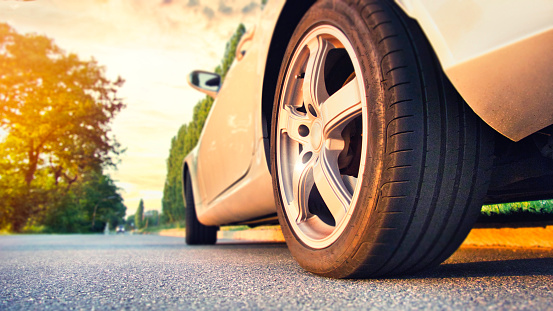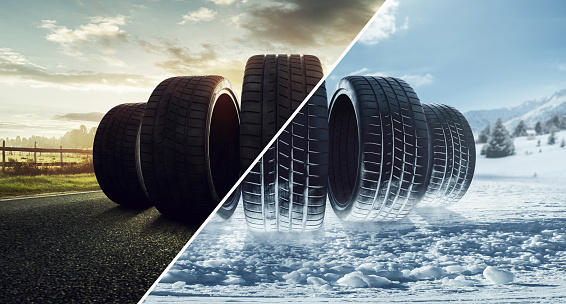November 21, 2024
What are Summer Tires or Performance Tires?
Summer tires, also known as performance tires, are a type of tire designed for use in warm weather conditions. They are made with a softer rubber compound than all-season or winter tires, which provides better grip and handling in dry and wet conditions.
Summer tires typically have a tread pattern with fewer grooves and sipes than all-season or winter tires, which allows for more contact between the tire and the road surface. This also helps to improve handling and responsiveness, especially during high-speed driving and cornering.
One potential downside of summer tires is that they may not perform as well in colder temperatures or on icy or snowy roads. In these conditions, winter tires or all-season tires may be more appropriate. It’s important to choose the right type of tire for the specific driving conditions you’ll be facing.
What are performance tires?
Performance tires are a type of tire designed for high-performance cars and driving conditions. They are typically designed with a focus on handling, cornering, and grip, and are made with specialized rubber compounds and tread patterns that provide enhanced traction and responsiveness.
Performance tires are usually wider and have a lower profile than standard tires, which allows for a larger contact patch with the road surface. This improves the tire’s ability to grip the road during high-speed maneuvers and tight turns.
Some common features of performance tires include asymmetrical tread patterns, larger tread blocks, and a softer rubber compound that provides better grip but may wear out faster than other tire types. They are often used on sports cars, racing vehicles, and other high-performance vehicles that require maximum grip and handling performance.
It’s important to note that performance tires may not be the best choice for all driving conditions, and may not perform as well in wet or snowy conditions. It’s important to choose the right tire for your specific needs and driving conditions.
Can you drive summer performance tires in winter?
It is not recommended to drive summer performance tires in winter conditions, especially in areas with snow, ice, and freezing temperatures. Summer tires are designed with a softer rubber compound that can become less pliable and lose traction in colder temperatures. This can lead to reduced grip, poor handling, and increased braking distances, which can be dangerous.
In contrast, winter tires are designed with a specialized rubber compound that remains pliable in colder temperatures, providing improved grip and traction on snow and ice-covered roads. They also have a tread pattern that helps to channel snow and slush away from the tire’s surface, further enhancing grip.
If you live in an area with cold winters and snowy or icy conditions, it is recommended to switch to winter tires during the winter months for the best performance and safety on the road. If you must drive with summer performance tires in winter, it is important to exercise caution, drive at slower speeds, and leave extra space between you and other vehicles.
Are summer tires OK in rain?
Summer tires can perform well in rain, but their effectiveness depends on the depth of the tread and the severity of the rain. Here’s what you should know:
Pros:
- Good Wet Grip: Summer tires are designed with tread compounds and patterns that provide excellent grip on wet roads during warmer temperatures.
- Better Water Displacement: High-performance summer tires often have grooves to channel water and reduce the risk of hydroplaning.
Cons:
- Tread Depth Matters: If the tread is worn, summer tires are more prone to hydroplaning in heavy rain.
- Cold Weather Limitation: Summer tires are not designed for cold temperatures, as their rubber becomes less pliable, reducing grip, even in wet conditions.
Recommendations:
- Inspect Tread Depth: Ensure your summer tires have adequate tread depth (generally, at least 4/32 of an inch is advisable for wet performance).
- Adjust Driving Style: In heavy rain, reduce your speed to maintain control and reduce the risk of hydroplaning.
- Consider Alternatives: If rain is frequent and intense, all-season or rain-specific tires might be a safer choice.
If you primarily drive in a warm climate with occasional rain, summer tires should be fine, provided they’re in good condition.
How long do summer tires last?
The lifespan of summer tires can vary depending on several factors, including the quality of the tire, the driving conditions, and the maintenance practices. Generally speaking, summer tires tend to have a shorter lifespan than all-season tires or winter tires, due to their softer rubber compound and more aggressive tread pattern.
On average, summer tires can last anywhere from 20,000 to 40,000 miles, but this can vary depending on the specific tire and driving conditions. High-performance summer tires may have a shorter lifespan due to the increased stress and wear they experience during high-speed driving and cornering.
Proper maintenance can also help to extend the lifespan of summer tires. This includes regular inspections for signs of damage or wear, proper inflation, and regular rotation to ensure even wear across all four tires. Driving habits can also impact the lifespan of summer tires. Aggressive driving, high-speed driving, and hard braking can all contribute to increased wear and reduce the lifespan of the tire.
Overall, it’s important to monitor your summer tires regularly and replace them when they show signs of wear or damage, even if they haven’t reached their mileage limit. This can help to ensure optimal performance and safety on the road.


